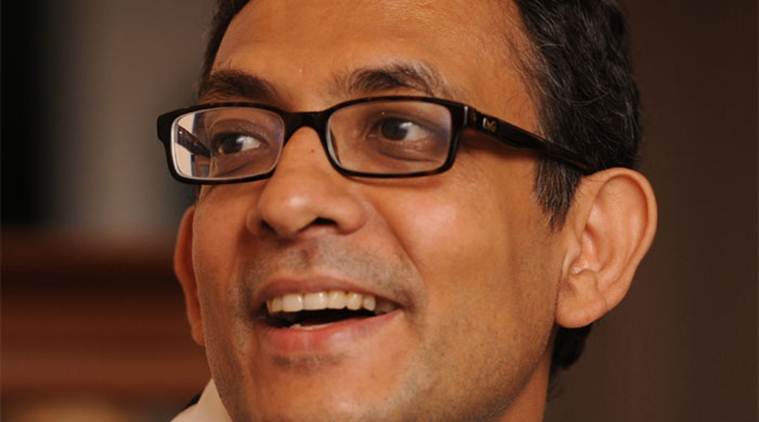On how Abhijit Banerjee’s Nobel Prize united India and divided social media
With the award of a Nobel prize to MIT economist Abhijit Banerjee, six laureates are now associated with West Bengal. Banerjee joins Mother Teresa, Sir CV Raman, Sir Ronald Ross and his own teacher Amartya Sen. Not to mention The Rabindranath, whom the rest of India irritably regards as the inventor of “Ravinder Sangeet”, of which they do not get the words and the two-and-a-half tunes it is set to can indeed become wearying on their own. While all of India celebrated the award, the press in Kolkata pulled out all the stops, and The Telegraph apparently had something about the Nobel on every page except the sports section. And the Saptaparni apartment complex where Banerjee’s mother Nirmala lives was overrun with cameramen accosting people in their homes, in elevators, practically anywhere.
While the award united India, responses on social media divided it. Predictably, Banerjee was identified as a leftie and a political divide emerged. Not many seem to know that Banerjee’s approach has been critiqued by his own friends, who happen to be on the left of the spectrum, and in academia, political affiliation does not — or should not — matter. On the sidelines of this political game, a peculiar scrap broke out between supporters of dhokla versus fans of meat (Bengalis love it), at least as intense as the rivalry between supporters of Mohun Bagan and Mohammedan Sporting. And there were snide remarks about how all the Bengalis seem to know Abhijit Banerjee and fondly call him Jhima. It isn’t unusual at all. Among Bengalis, knowing other Bengalis is a popular hobby. They collect Bengali friends and acquaintances with the energy with which children collect Pokémon cards. But unlike children, they never trade them. Not one of them would exchange Jhima for someone else’s friend.
From this happy story, to a grim report in the internet edition of The New York Times, reported from Myanmar by Southeast Asia bureau chief Hannah Beech and photographer Adam Dean. The content is unusual enough, with an unequivocal accusation of a cover-up of the cleansing of Rohingyas. In a briefing, “Officials showed them maps, diagrams and slide shows that were entirely made up.” They speak of a camp in Sittwe: “Doctors, lawyers and former politicians live forgotten in ghettos, like Jews once did in Nazi Germany.” In locations where the government tried to show investment, “What we saw was emptiness, a missing people.” At a reception centre for returning Rohingyas, “Security forces with neatly combed hair sat at desks, ready to receive the Rohingya. But it was a charade. As we left, officials flipped off the lights. A generator juddered to a stop. Men slipped out of their uniforms. The computers, supposedly meant to record all the returning Rohingya, were never even turned on.” In Ngan Chaung in Rakhine, they were able to see a real Muslim village only because a breakdown separated their car from the government convoy.
But it is rendered especially striking by the mode of storytelling used by Jin Wu, Jon Huang and Meg Felling, who produced the programme. It is a slideshow made up of video, stills and text, with no sound except the reporter’s voice-over. The combination of media makes the story much starker and more telling than it would have been if it had appeared in a single, traditional format, like television or print.
Meanwhile, some unusual formatting was imposed on Mark Zuckerberg’s defence of Facebook at Georgetown University, as an enabler of free speech. He took no questions from the press, but only from students. The speech seemed to signify that Facebook is reluctant to do due diligence on hate speech which may lead to real consequences for people, while other platforms have moved on the problem. But it was a mistake to refer to Martin Luther King Jr, while saying that in stressed times, it is human nature to impose curbs on speech, and that people want the benefits of free speech but not the tensions that come with it.
By way of example, Zuckerberg referred to curbs on campus protest during the Vietnam War, a socialist leader threatened with jail for opposing American involvement in World War I, and the letter written from jail in Birmingham by Martin Luther King Jr explaining the validity of non-violent protest, which became a foundational document of the American civil rights movement. King’s daughter Bernice responded caustically: “I’d like to help Facebook better understand the challenges #MLK faced from disinformation campaigns launched by politicians. These campaigns created an atmosphere for his assassination.”
Speaking of atmosphere, there was this prime-time programme on AajTak titled “Janmabhoomi hamari, Ram hamare, masjid-waale kahan se padhare?” It is scarcely believable that the India Today group, once famed for its even-handed coverage of Nellie, Bhagalpur and other rifts in the body politic, could so readily keel over to the rhetoric of the day.
For latest coverage on Haryana and Maharashtra Elections, log on to IndianExpress.com. We bring you the fastest assembly election 2019 updates from each constituency in both the states.
Source: Read Full Article


